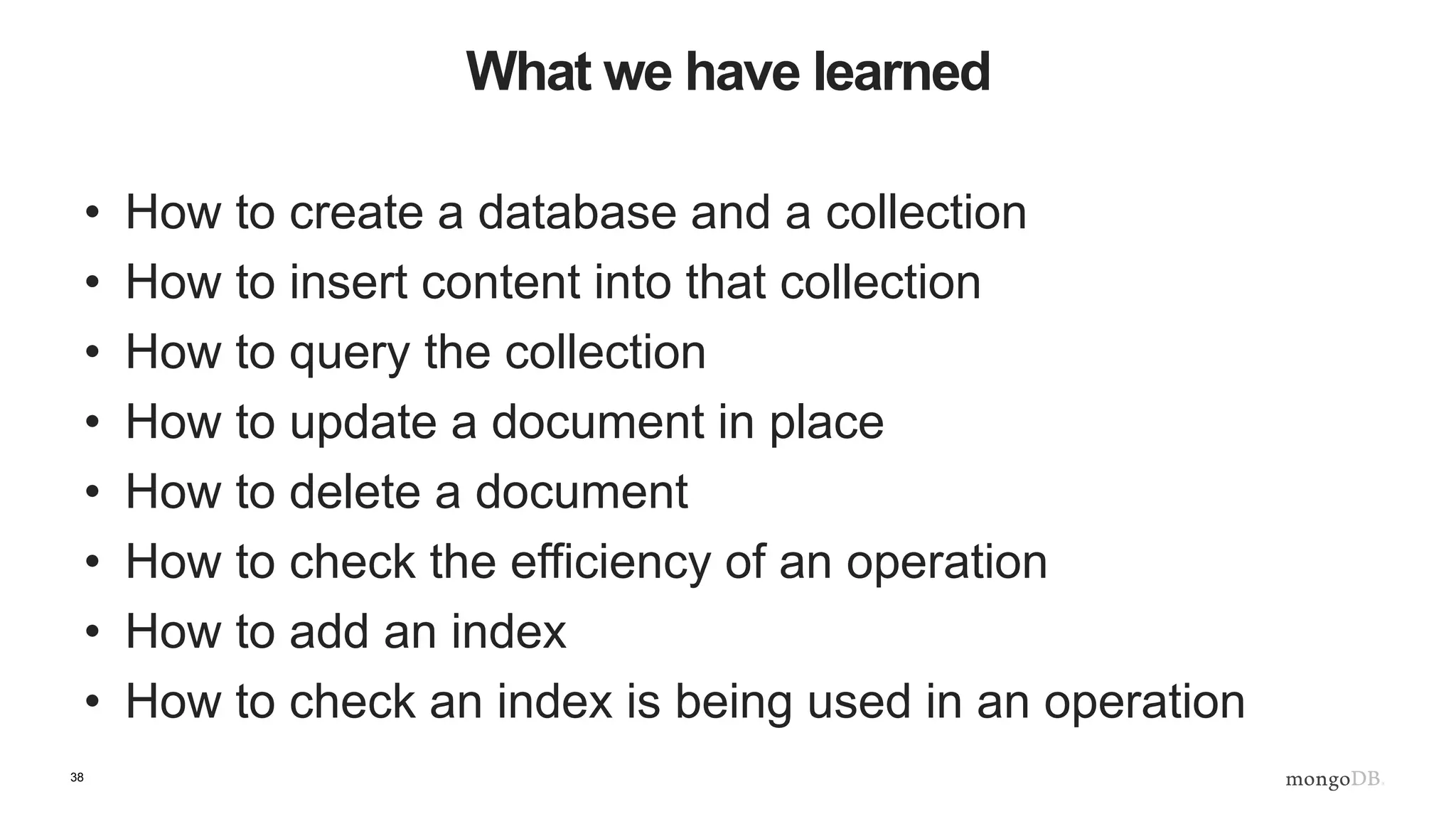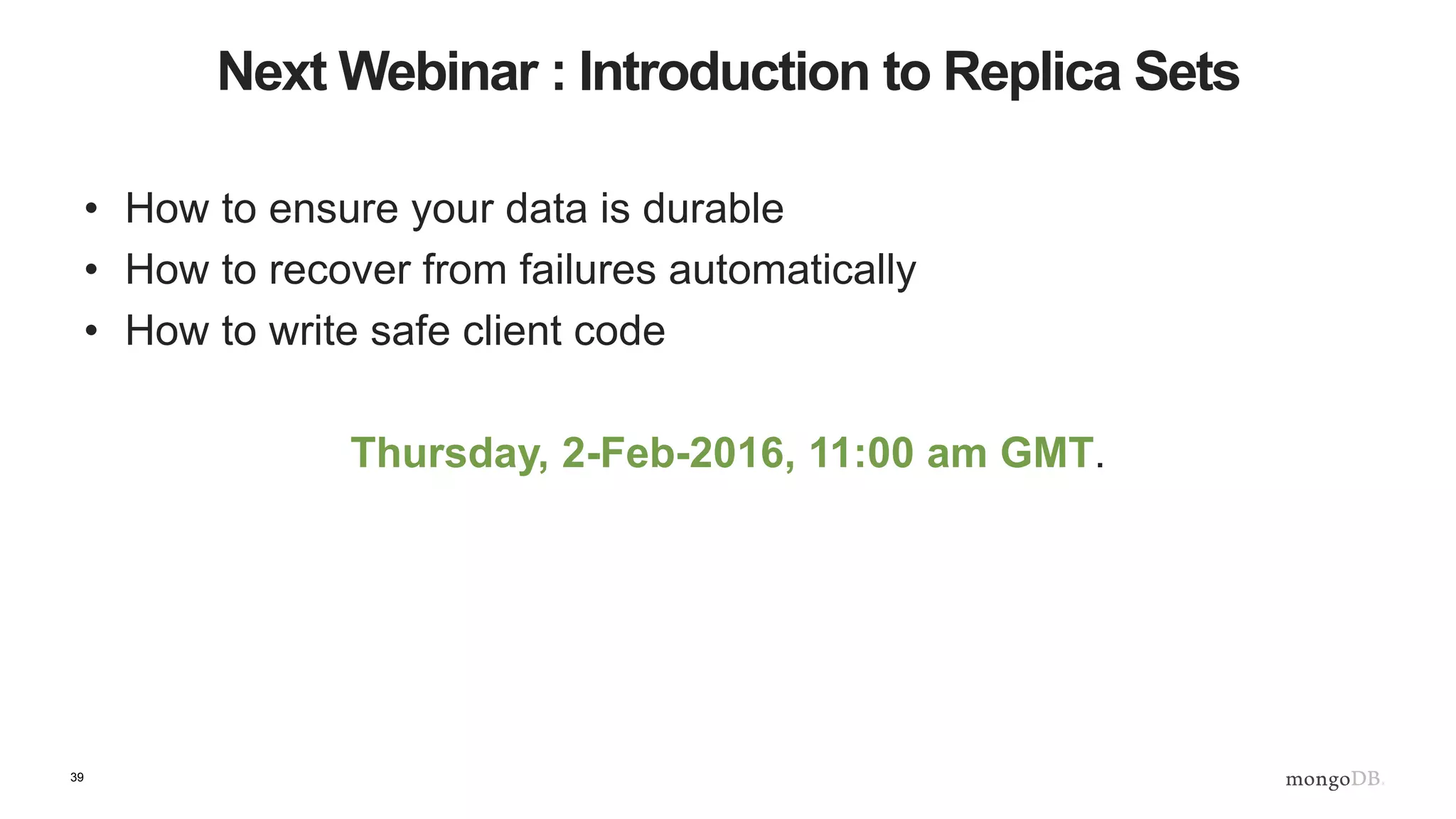- The document is a slide deck for a webinar on building a basic blogging application using MongoDB. - It covers MongoDB concepts like documents, collections and indexes. It then demonstrates how to install MongoDB, connect to it using the mongo shell, and insert documents. - The slide deck proceeds to model a basic blogging application using MongoDB, creating collections for users, articles and comments. It shows how to query, update, and import large amounts of seeded data.

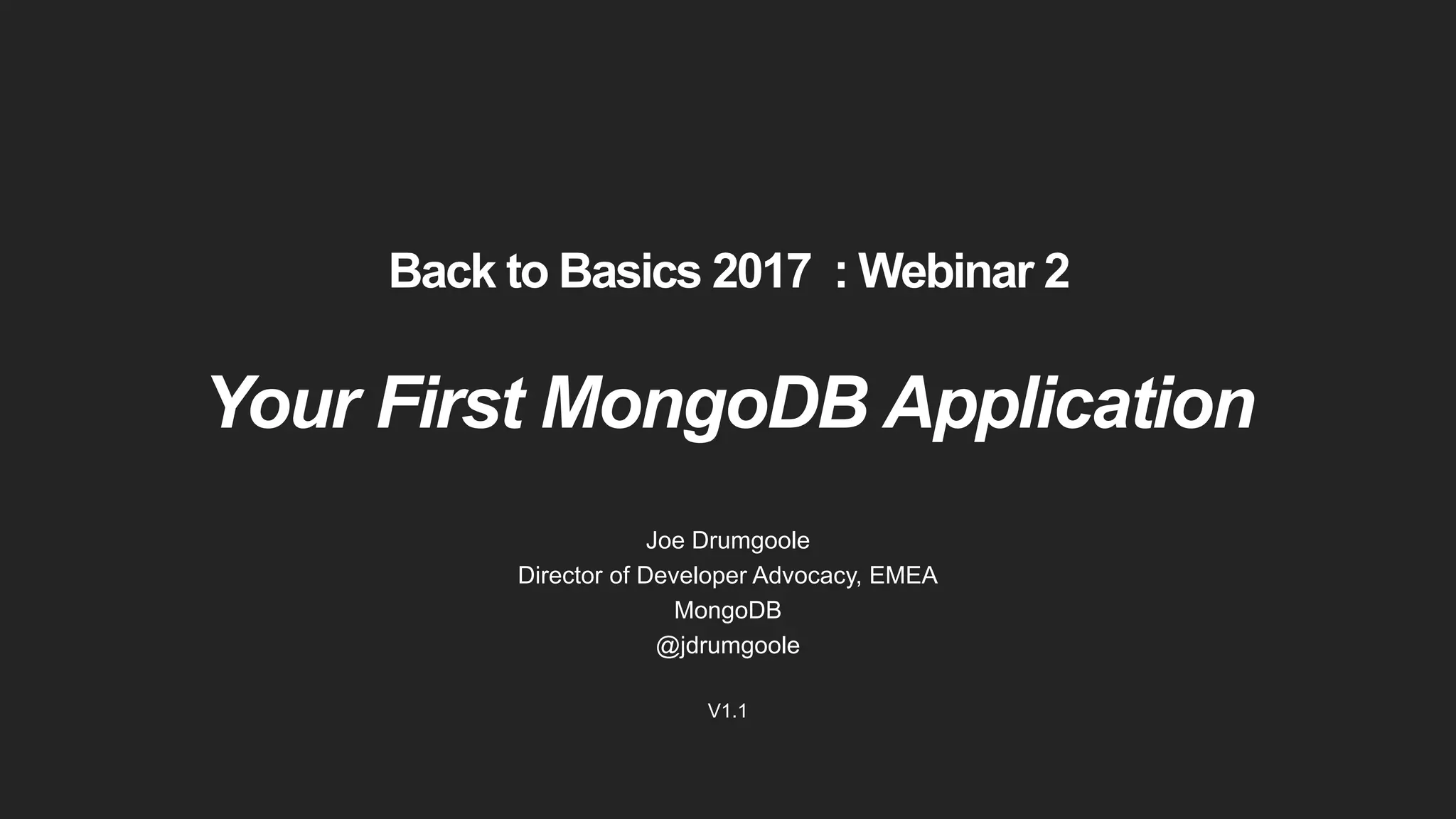
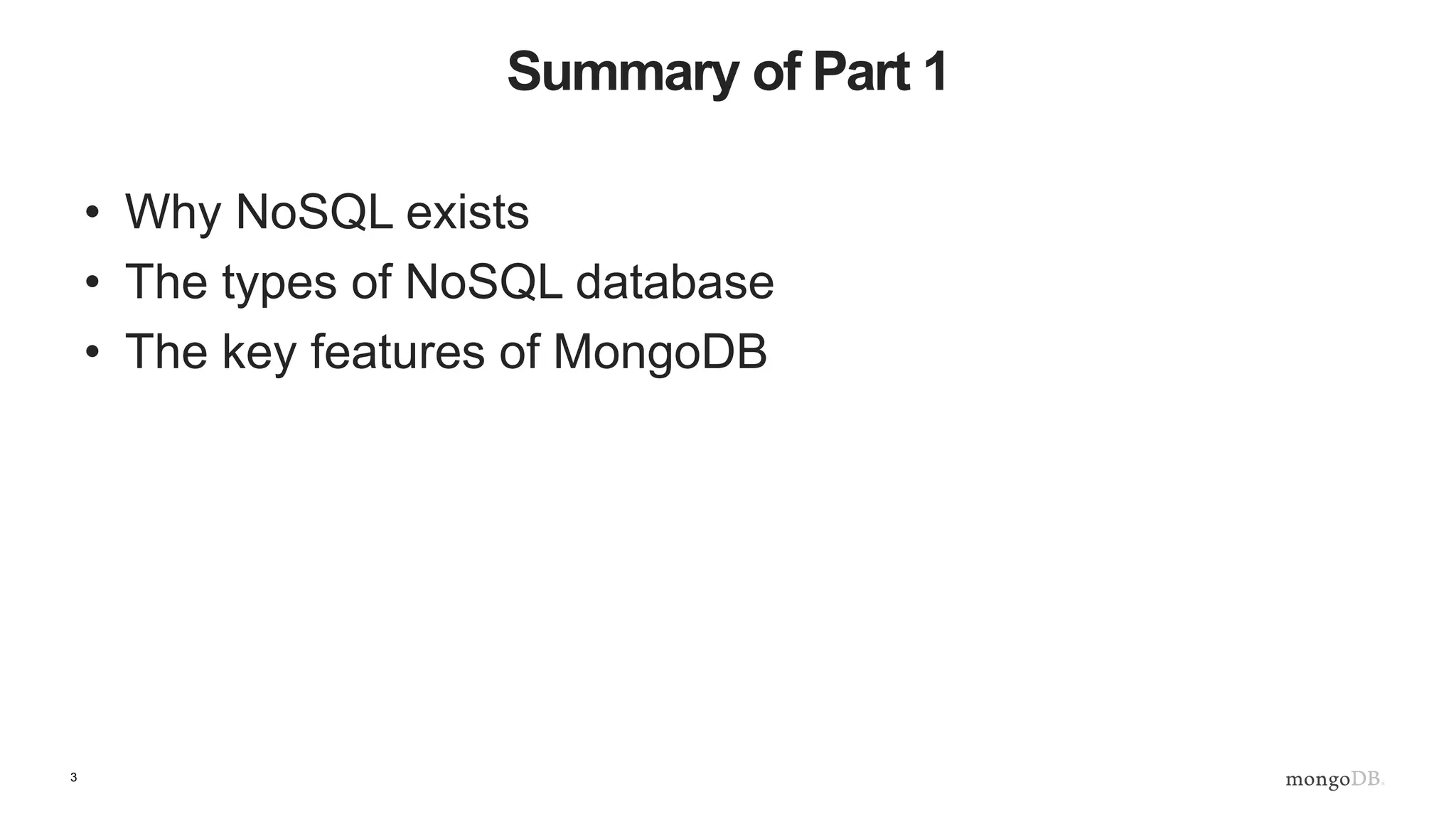
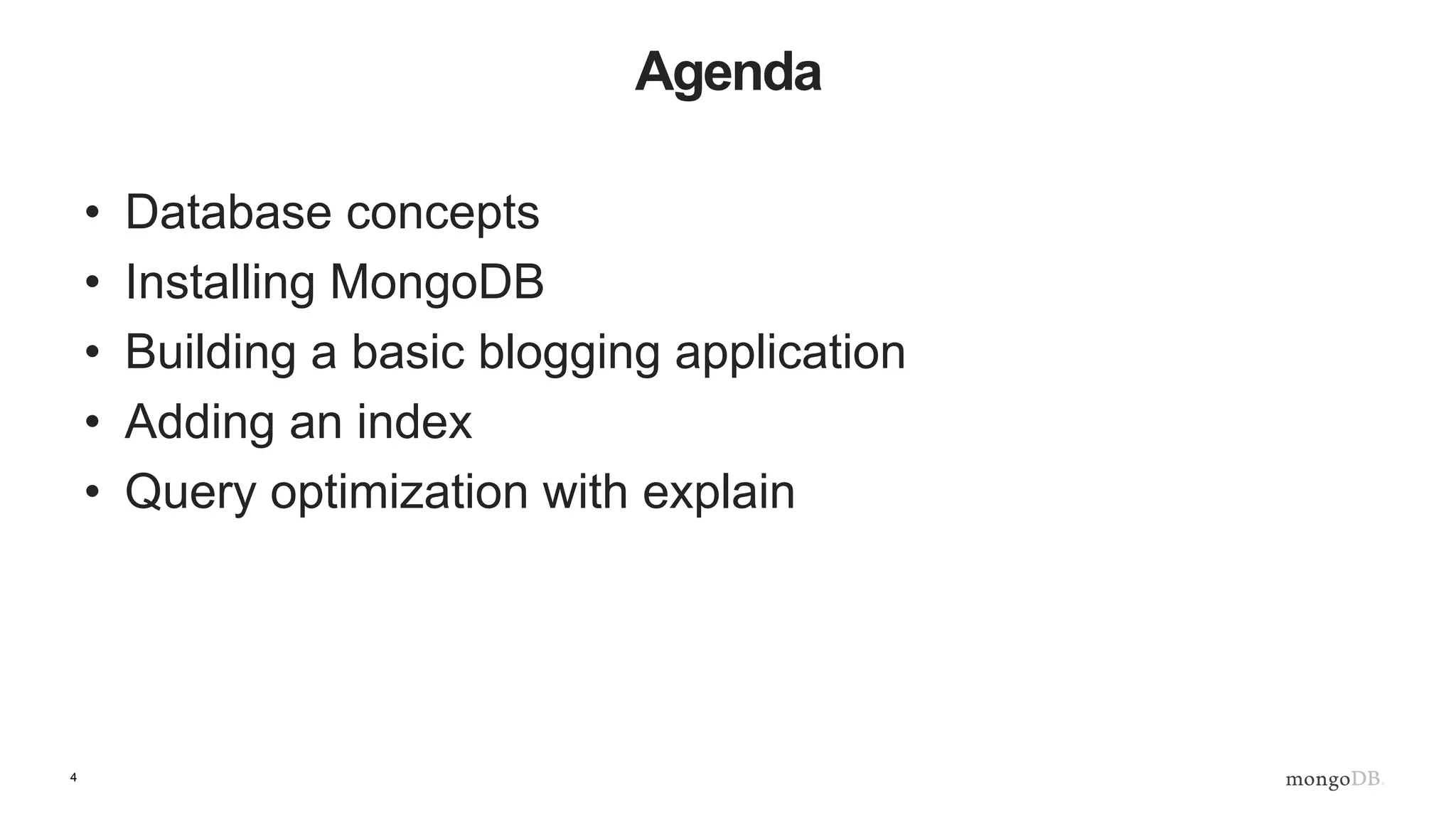
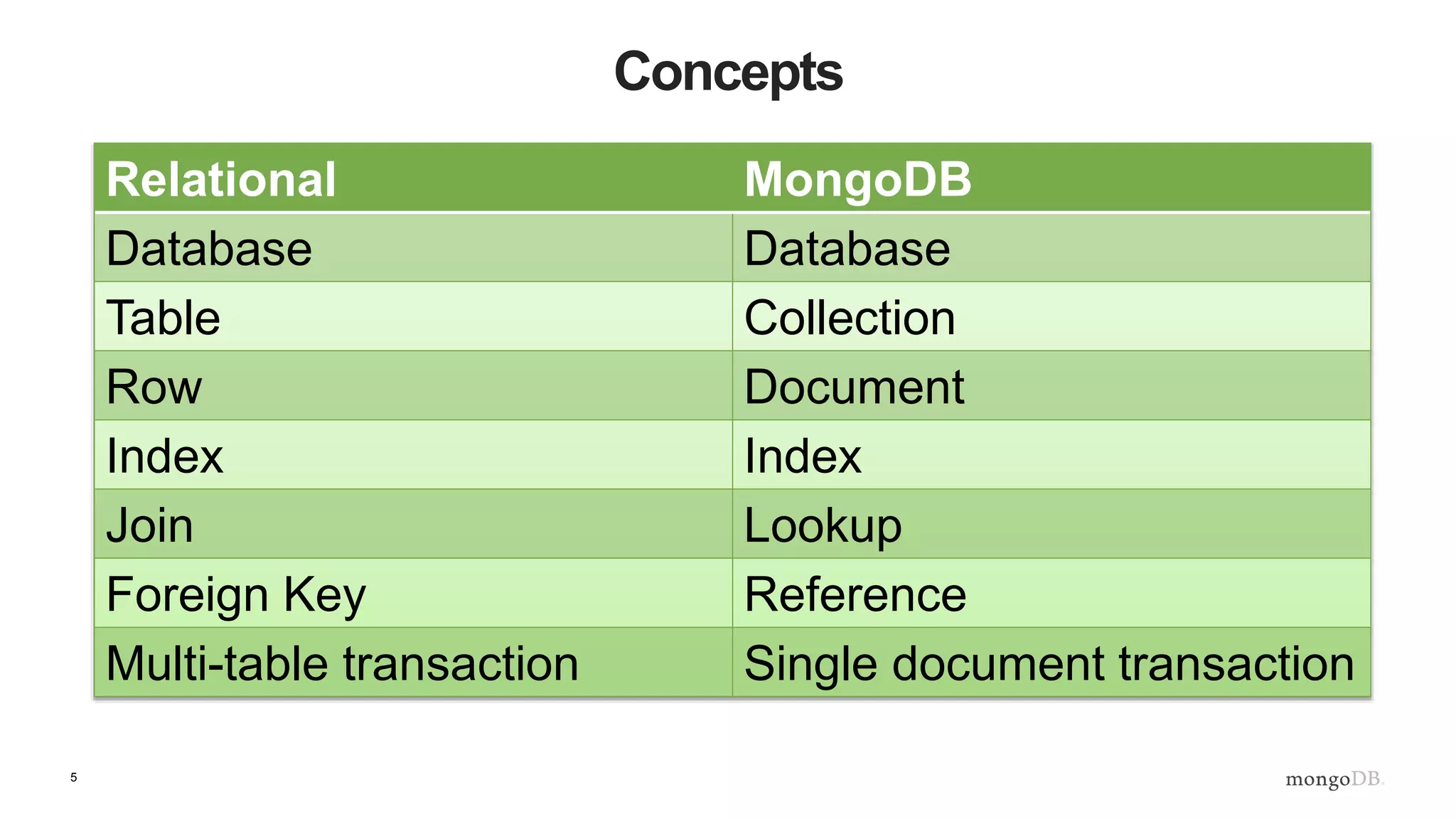
![6 Document Store { name : “Joe Drumgoole”, title : “Director of Developer Advocacy”, Address : { address1 : “Latin Hall”, address2 : “Golden Lane”, eircode : “D09 N623”, } expertise: [ “MongoDB”, “Python”, “Javascript” ], employee_number : 320, location : [ 53.34, -6.26 ] }](https://image.slidesharecdn.com/b2b-webinar-2-yourfirstmongodbapplication-1-170126162857/75/Back-to-Basics-My-First-MongoDB-Application-6-2048.jpg)
![7 MongoDB Documents are Typed { name : “Joe Drumgoole”, title : “Director of Developer Advocacy”, Address : { address1 : “Latin Hall”, address2 : “Golden Lane”, eircode : “D09 N623”, } expertise: [ “MongoDB”, “Python”, “Javascript” ], employee_number : 320, location : [ 53.34, -6.26 ] } Strings Nested Document Array Integer Geo-spatial Coordinates](https://image.slidesharecdn.com/b2b-webinar-2-yourfirstmongodbapplication-1-170126162857/75/Back-to-Basics-My-First-MongoDB-Application-7-2048.jpg)

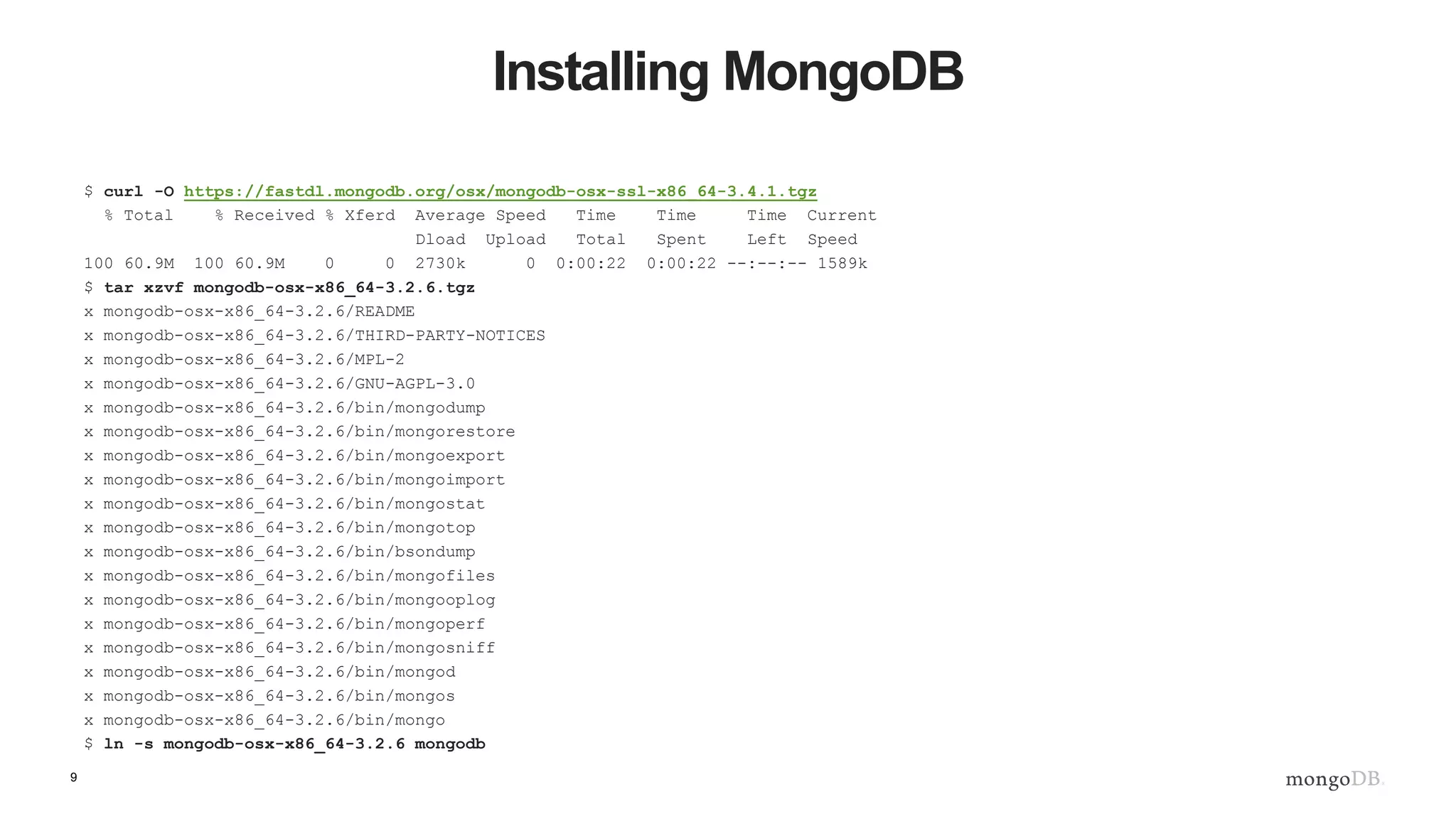
![10 Running mongod JD10Gen:mongodb jdrumgoole$ ./bin/mongod --dbpath /data/b2b 2016-05-23T19:21:07.767+0100 I CONTROL [initandlisten] MongoDB starting : pid=49209 port=27017 dbpath=/data/b2b 64- bit host=JD10Gen.local 2016-05-23T19:21:07.768+0100 I CONTROL [initandlisten] db version v3.2.6 2016-05-23T19:21:07.768+0100 I CONTROL [initandlisten] git version: 05552b562c7a0b3143a729aaa0838e558dc49b25 2016-05-23T19:21:07.768+0100 I CONTROL [initandlisten] allocator: system 2016-05-23T19:21:07.768+0100 I CONTROL [initandlisten] modules: none 2016-05-23T19:21:07.768+0100 I CONTROL [initandlisten] build environment: 2016-05-23T19:21:07.768+0100 I CONTROL [initandlisten] distarch: x86_64 2016-05-23T19:21:07.768+0100 I CONTROL [initandlisten] target_arch: x86_64 2016-05-23T19:21:07.768+0100 I CONTROL [initandlisten] options: { storage: { dbPath: "/data/b2b" } } 2016-05-23T19:21:07.769+0100 I - [initandlisten] Detected data files in /data/b2b created by the 'wiredTiger' storage engine, so setting the active storage engine to 'wiredTiger'. 2016-05-23T19:21:07.769+0100 I STORAGE [initandlisten] wiredtiger_open config: create,cache_size=4G,session_max=20000,eviction=(threads_max=4),config_base=false,statistics=(fast),log=(enabled=true ,archive=true,path=journal,compressor=snappy),file_manager=(close_idle_time=100000),checkpoint=(wait=60,log_size=2GB) ,statistics_log=(wait=0), 2016-05-23T19:21:08.837+0100 I CONTROL [initandlisten] 2016-05-23T19:21:08.838+0100 I CONTROL [initandlisten] ** WARNING: soft rlimits too low. Number of files is 256, should be at least 1000 2016-05-23T19:21:08.840+0100 I NETWORK [HostnameCanonicalizationWorker] Starting hostname canonicalization worker 2016-05-23T19:21:08.840+0100 I FTDC [initandlisten] Initializing full-time diagnostic data capture with directory '/data/b2b/diagnostic.data' 2016-05-23T19:21:08.841+0100 I NETWORK [initandlisten] waiting for connections on port 27017 2016-05-23T19:21:09.148+0100 I NETWORK [initandlisten] connection accepted from 127.0.0.1:59213 #1 (1 connection now open)](https://image.slidesharecdn.com/b2b-webinar-2-yourfirstmongodbapplication-1-170126162857/75/Back-to-Basics-My-First-MongoDB-Application-10-2048.jpg)
![11 Connecting Via The Shell $ ./bin/mongo MongoDB shell version: 3.2.6 connecting to: test Server has startup warnings: 2016-05-17T11:46:03.516+0100 I CONTROL [initandlisten] 2016-05-17T11:46:03.516+0100 I CONTROL [initandlisten] ** WARNING: soft rlimits too low. Number of files is 256, should be at least 1000 >](https://image.slidesharecdn.com/b2b-webinar-2-yourfirstmongodbapplication-1-170126162857/75/Back-to-Basics-My-First-MongoDB-Application-11-2048.jpg)
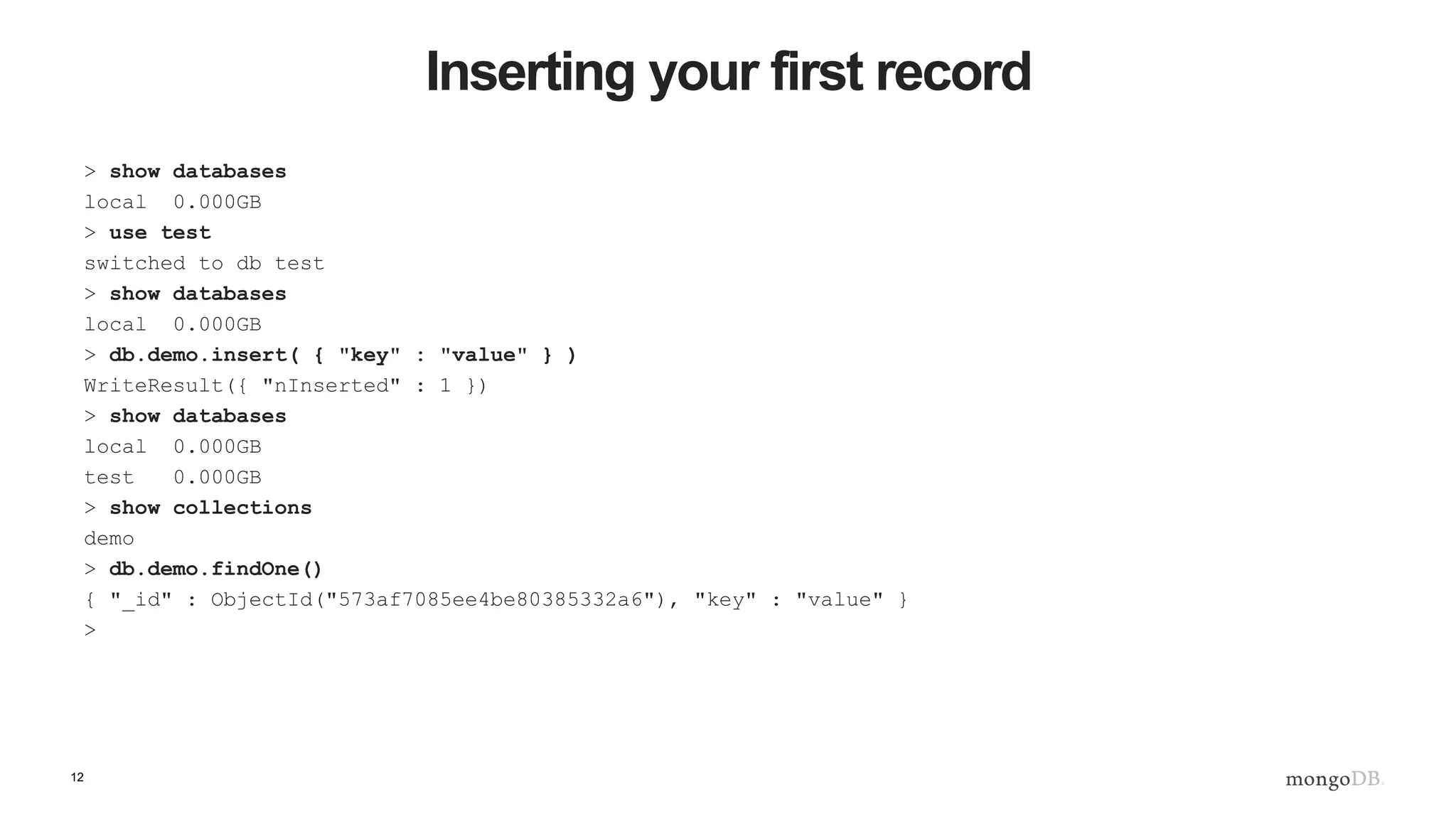
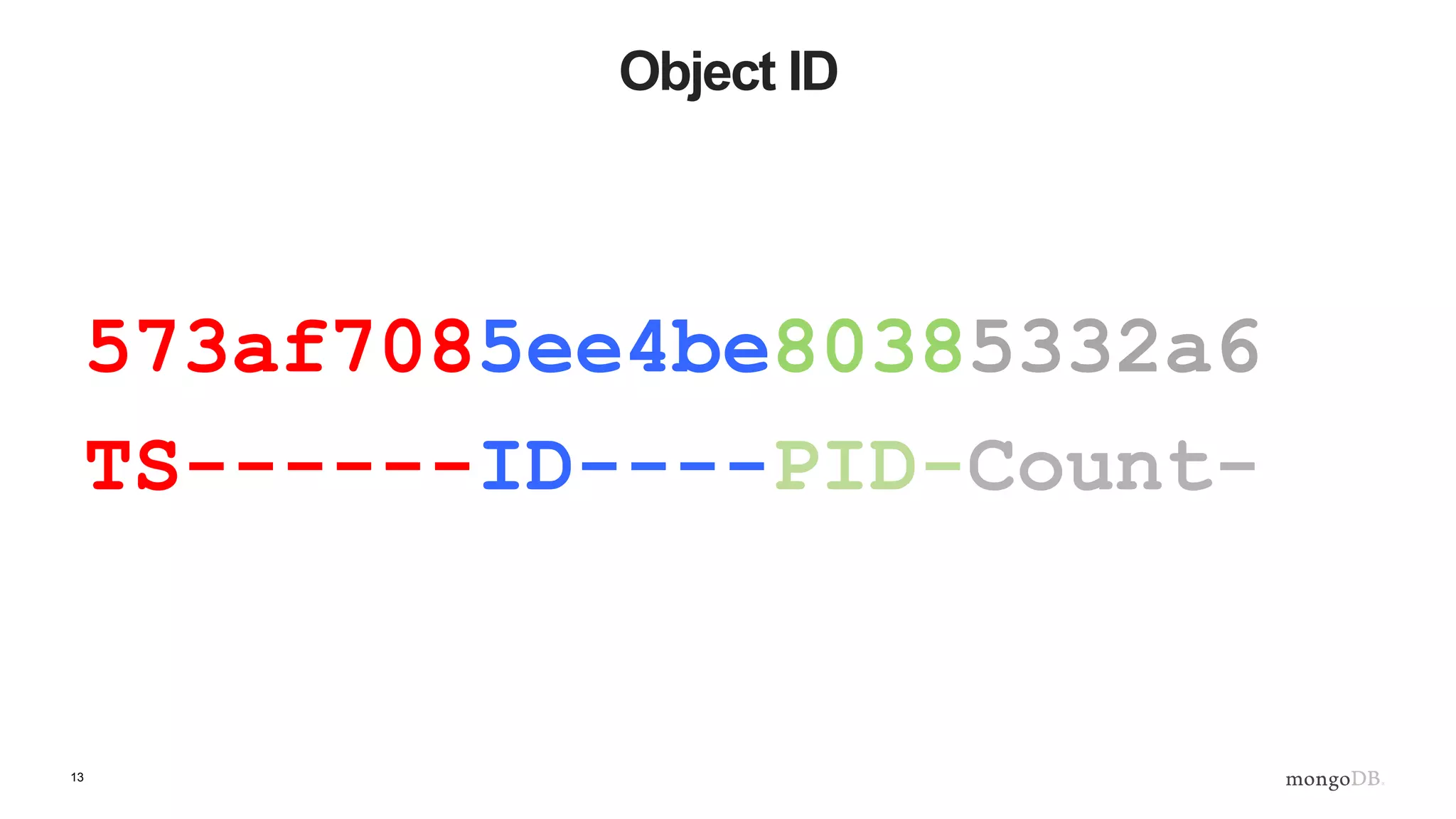
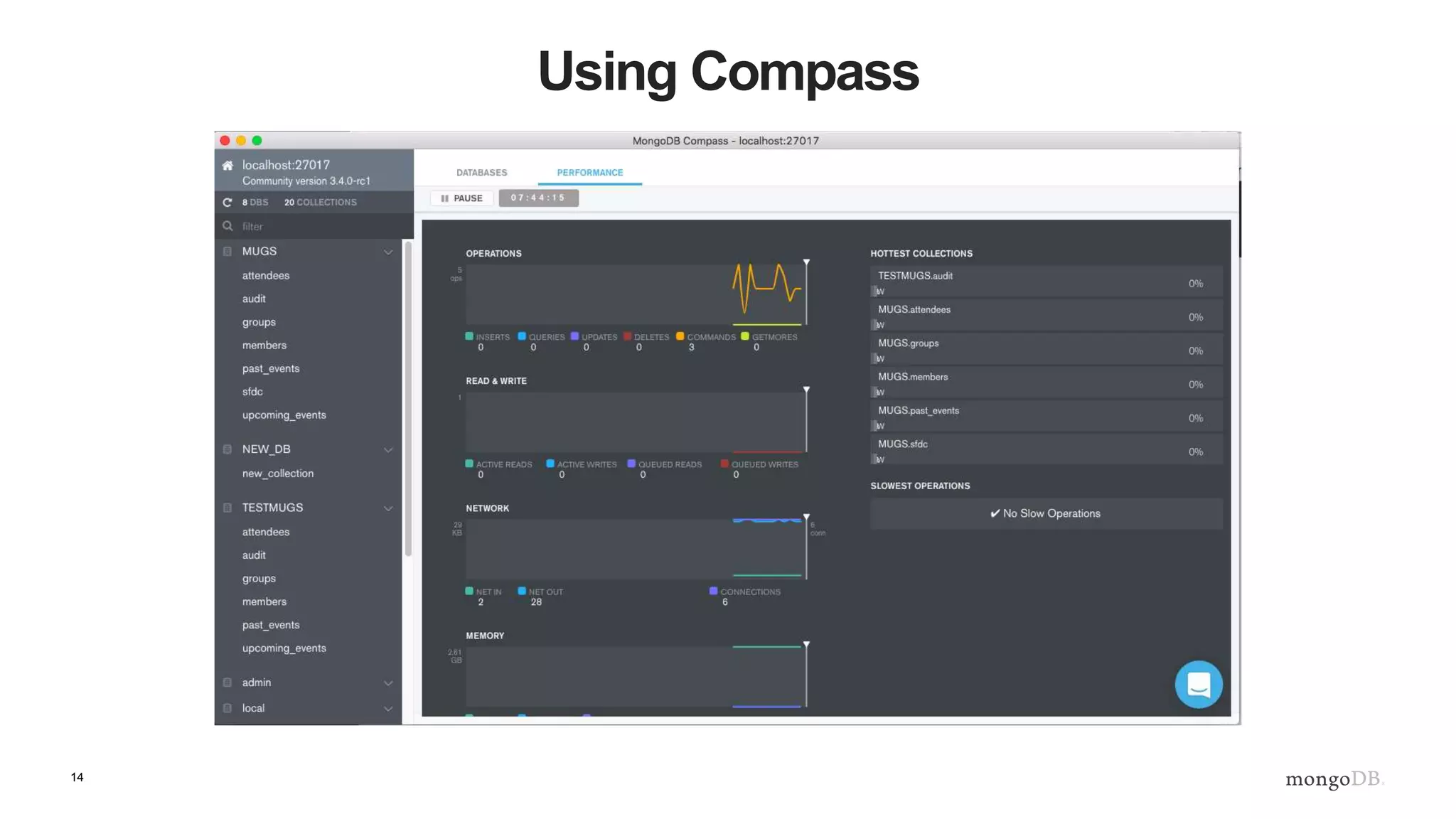
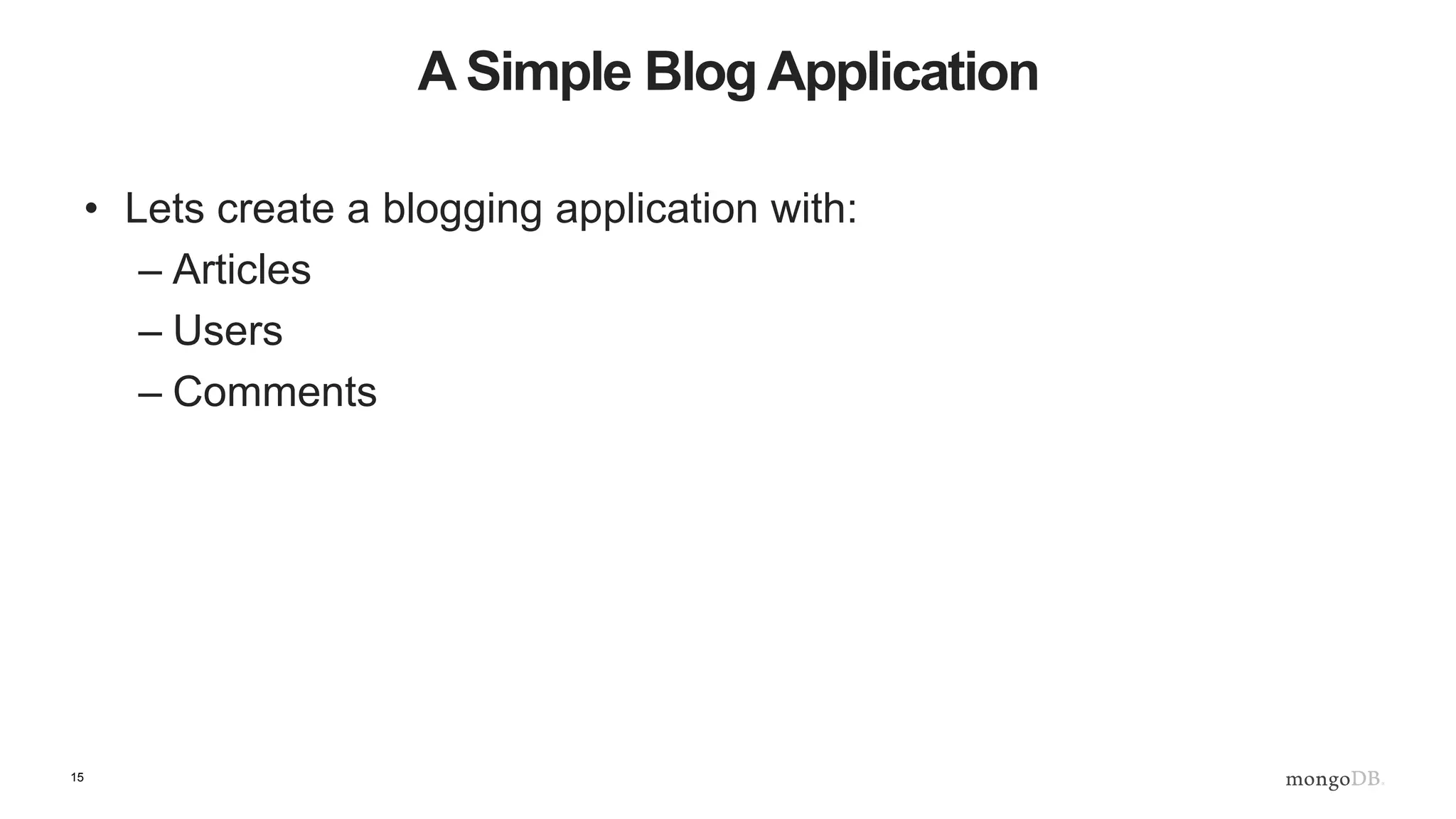
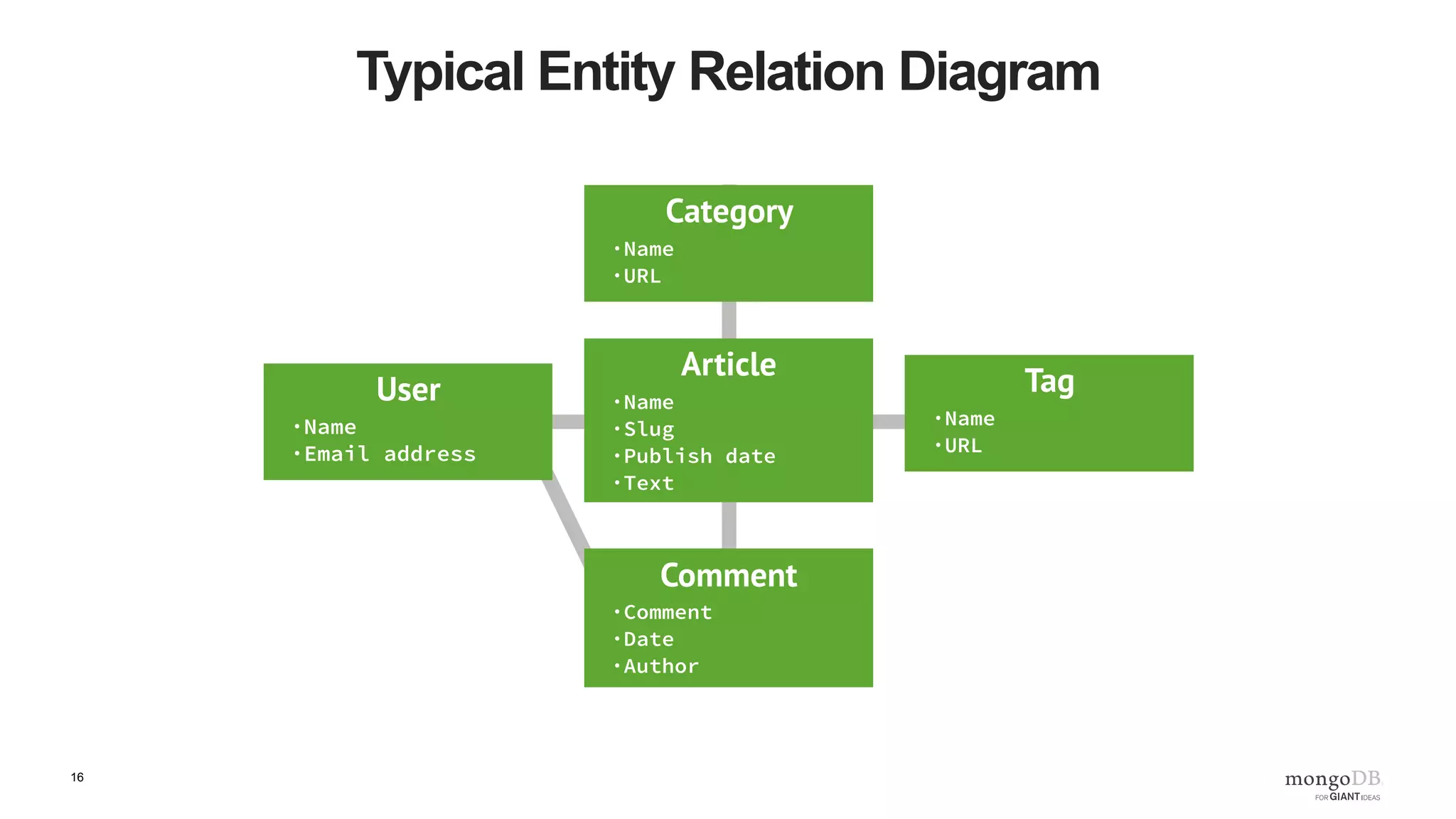
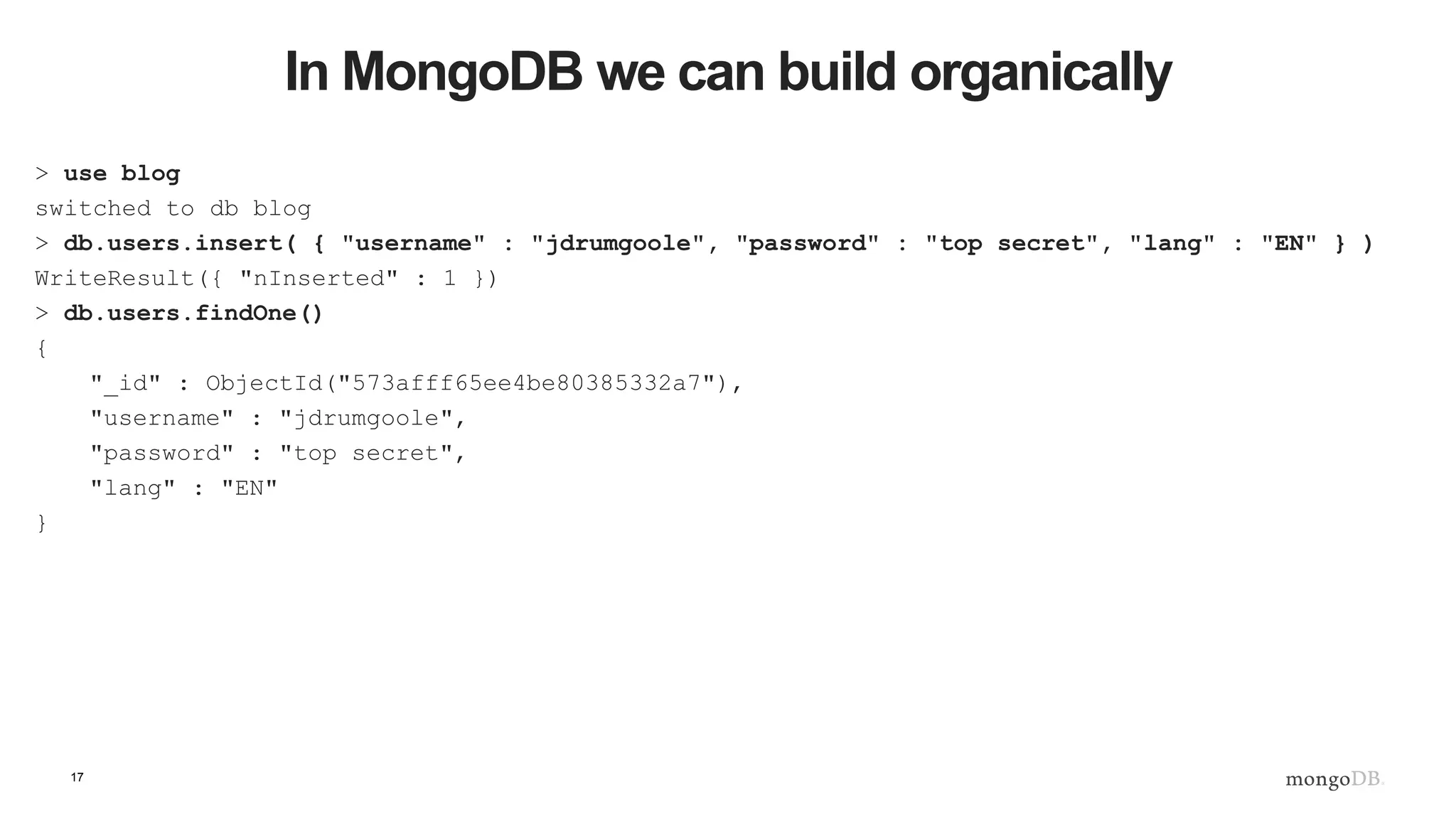
![18 How do we do this in a program? ''' Created on 17 May 2016 @author: jdrumgoole ''' import pymongo # # client defaults to localhost and port 27017. eg MongoClient('localhost', 27017) client = pymongo.MongoClient() blogDatabase = client[ "blog" ] usersCollection = blogDatabase[ "users" ] usersCollection.insert_one( { "username" : "jdrumgoole", "password" : "top secret", "lang" : "EN" }) user = usersCollection.find_one() print( user )](https://image.slidesharecdn.com/b2b-webinar-2-yourfirstmongodbapplication-1-170126162857/75/Back-to-Basics-My-First-MongoDB-Application-18-2048.jpg)
![19 Next up Articles … articlesCollection = blogDatabase[ "articles" ] author = "jdrumgoole" article = { "title" : "This is my first post", "body" : "The is the longer body text for my blog post. We can add lots of text here.", "author" : author, "tags" : [ "joe", "general", "Ireland", "admin" ] } # # Lets check if our author exists # if usersCollection.find_one( { "username" : author }) : articlesCollection.insert_one( article ) else: raise ValueError( "Author %s does not exist" % author )](https://image.slidesharecdn.com/b2b-webinar-2-yourfirstmongodbapplication-1-170126162857/75/Back-to-Basics-My-First-MongoDB-Application-19-2048.jpg)
![20 Create a new type of article # # Lets add a new type of article with a posting date and a section # author = "jdrumgoole" title = "This is a post on MongoDB" newPost = { "title" : title, "body" : "MongoDB is the worlds most popular NoSQL database. It is a document database", "author" : author, "tags" : [ "joe", "mongodb", "Ireland" ], "section" : "technology", "postDate" : datetime.datetime.now(), } # # Lets check if our author exists # if usersCollection.find_one( { "username" : author }) : articlesCollection.insert_one( newPost )](https://image.slidesharecdn.com/b2b-webinar-2-yourfirstmongodbapplication-1-170126162857/75/Back-to-Basics-My-First-MongoDB-Application-20-2048.jpg)
![21 Make a lot of articles 1 import pymongo import string import datetime import random def randomString( size, letters = string.letters ): return "".join( [random.choice( letters ) for _ in xrange( size )] ) client = pymongo.MongoClient() def makeArticle( count, author, timestamp ): return { "_id" : count, "title" : randomString( 20 ), "body" : randomString( 80 ), "author" : author, "postdate" : timestamp } def makeUser( username ): return { "username" : username, "password" : randomString( 10 ) , "karma" : random.randint( 0, 500 ), "lang" : "EN" }](https://image.slidesharecdn.com/b2b-webinar-2-yourfirstmongodbapplication-1-170126162857/75/Back-to-Basics-My-First-MongoDB-Application-21-2048.jpg)
![22 Make a lot of articles 2 blogDatabase = client[ "blog" ] usersCollection = blogDatabase[ "users" ] articlesCollection = blogDatabase[ "articles" ] bulkUsers = usersCollection.initialize_ordered_bulk_op() bulkArticles = articlesCollection.initialize_ordered_bulk_op() ts = datetime.datetime.now() for i in range( 1000000 ) : #username = randomString( 10, string.ascii_uppercase ) + "_" + str( i ) username = "USER_" + str( i ) bulkUsers.insert( makeUser( username ) ) ts = ts + datetime.timedelta( seconds = 1 ) bulkArticles.insert( makeArticle( i, username, ts )) if ( i % 500 == 0 ) : bulkUsers.execute() bulkArticles.execute() bulkUsers = usersCollection.initialize_ordered_bulk_op() bulkArticles = articlesCollection.initialize_ordered_bulk_op() bulkUsers.execute() bulkArticles.execute()](https://image.slidesharecdn.com/b2b-webinar-2-yourfirstmongodbapplication-1-170126162857/75/Back-to-Basics-My-First-MongoDB-Application-22-2048.jpg)
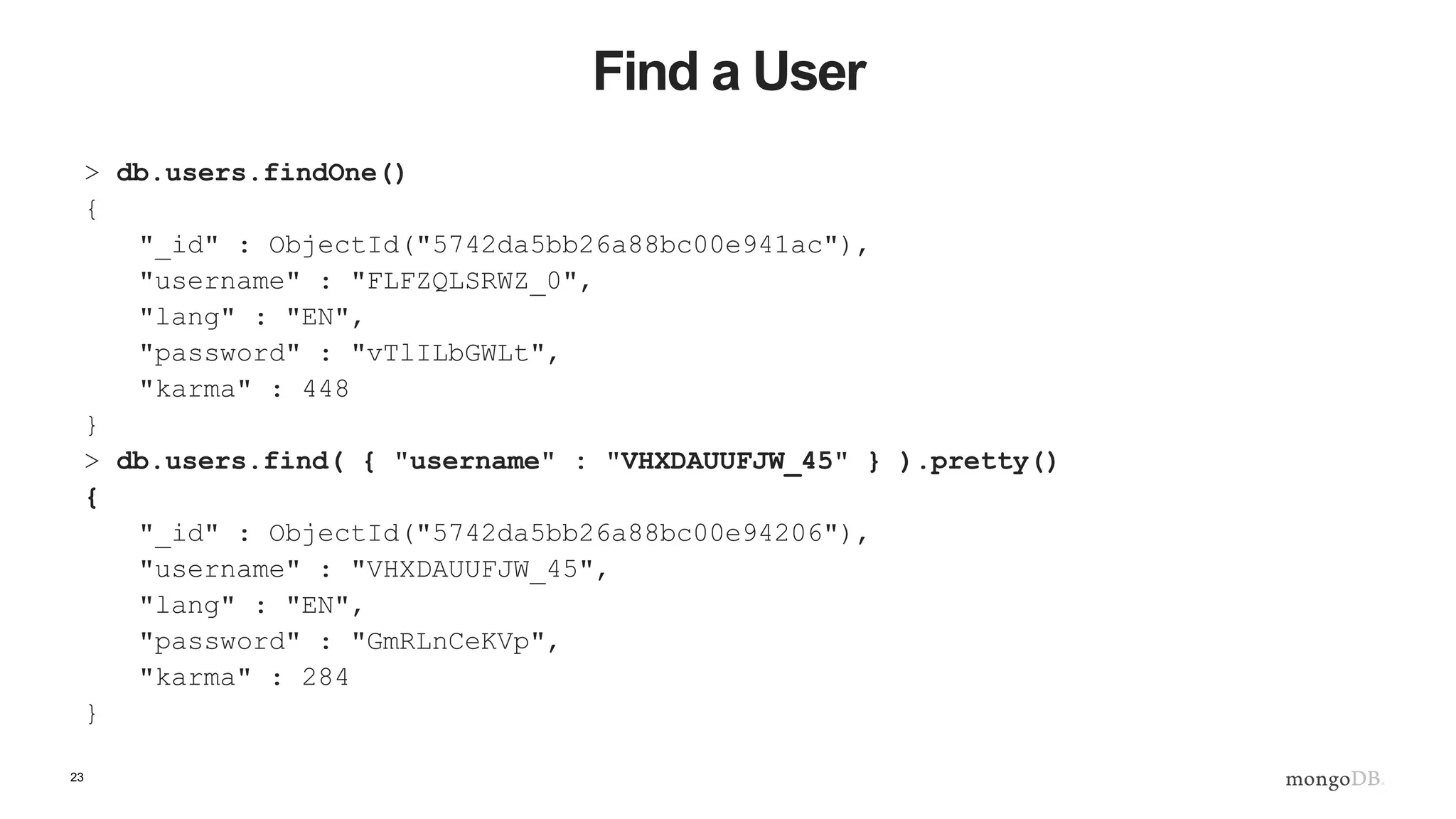
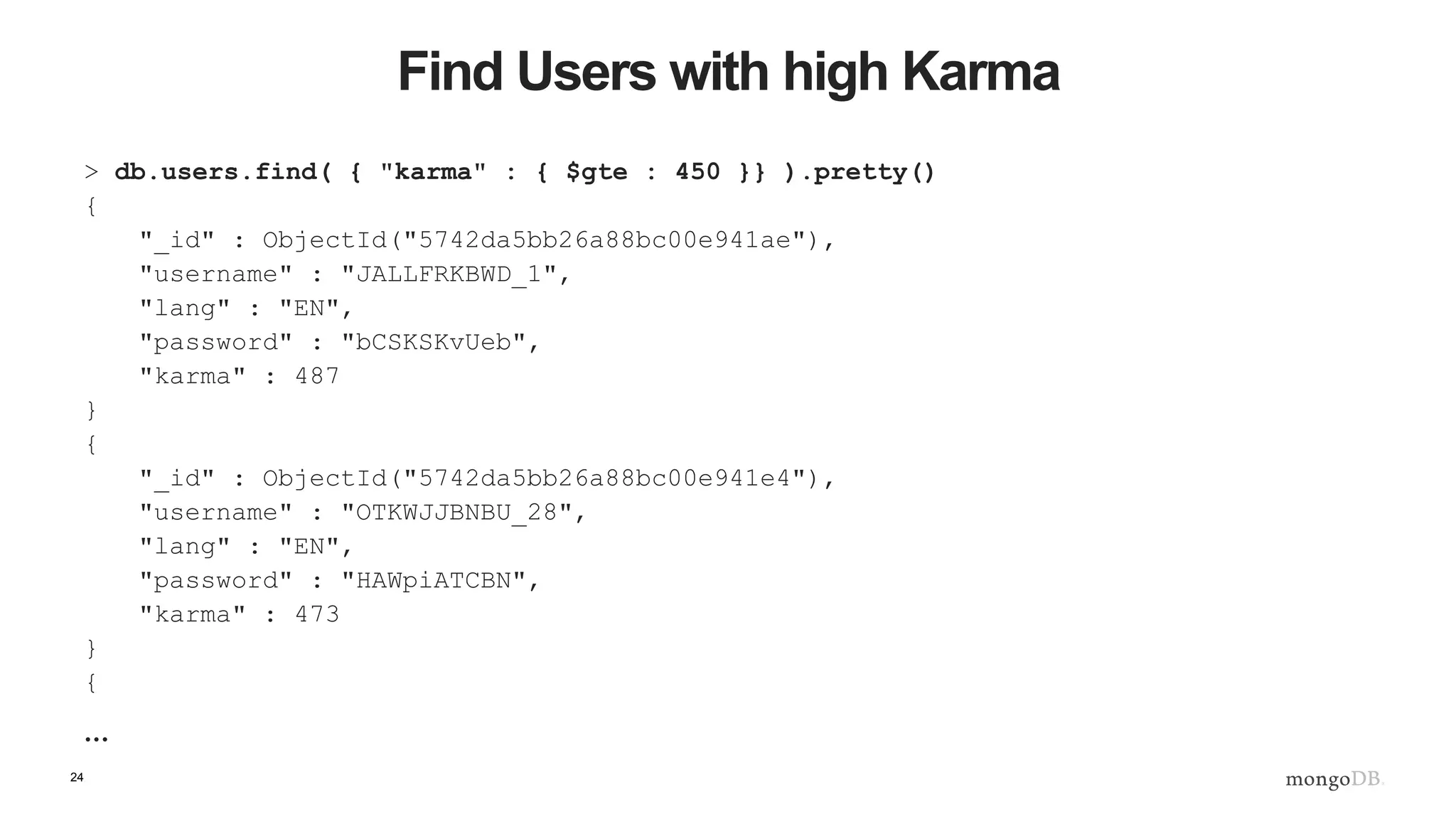
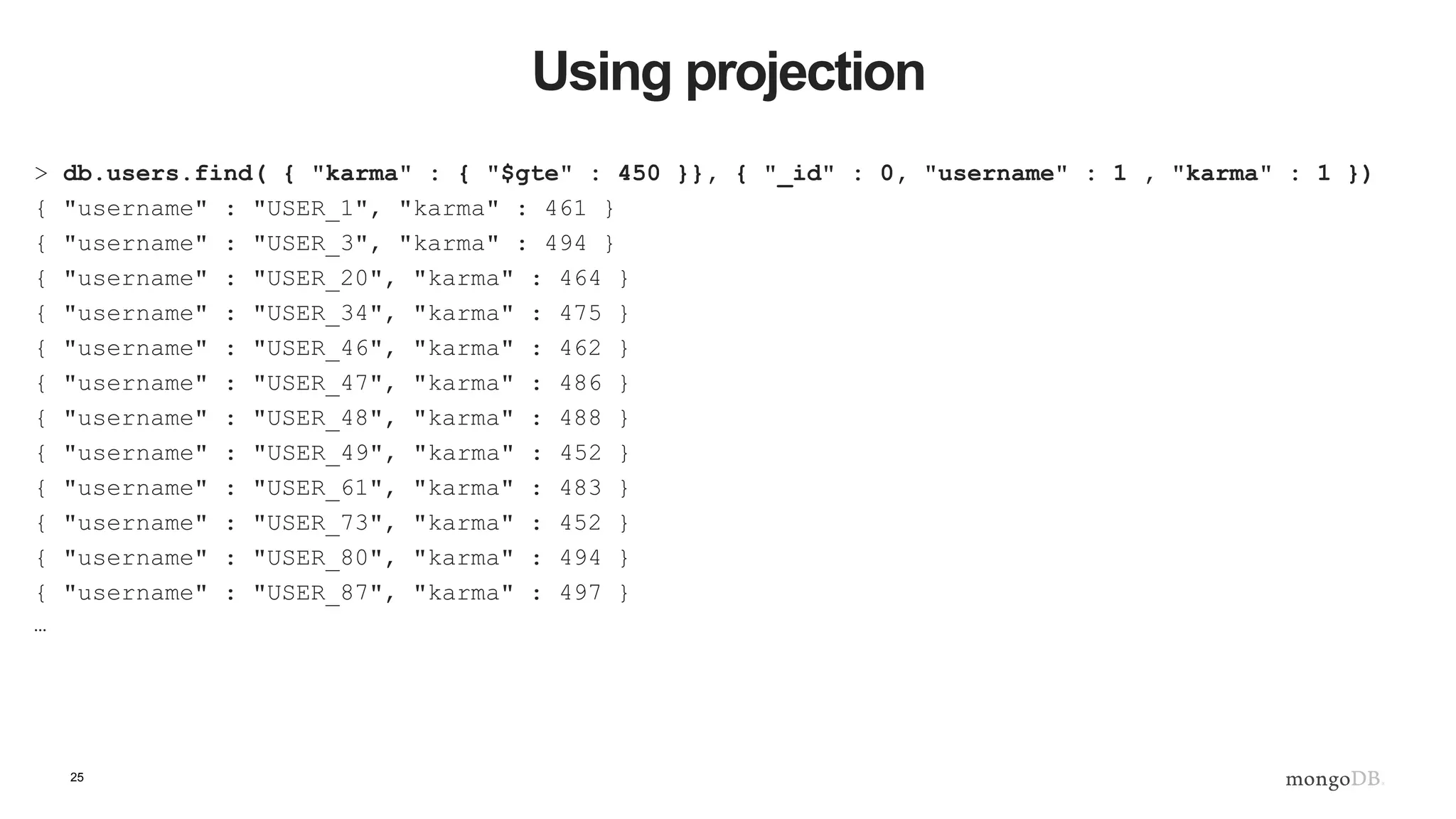
![26 Update an article to add Comments 1 > db.articles.find( { "_id" : 19 } ).pretty() { "_id" : 19, "body" : "nTzOofOcnHKkJxpjKAyqTTnKZMFzzkWFeXtBRuEKsctuGBgWIrEBrYdvFIVHJWaXLUTVUXblOZZgUq Wu", "postdate" : ISODate("2016-05-23T12:02:46.830Z"), "author" : "ASWTOMMABN_19", "title" : "CPMaqHtAdRwLXhlUvsej" } > db.articles.update( { _id : 18 }, { $set : { comments : [] }} ) WriteResult({ "nMatched" : 1, "nUpserted" : 0, "nModified" : 1 })](https://image.slidesharecdn.com/b2b-webinar-2-yourfirstmongodbapplication-1-170126162857/75/Back-to-Basics-My-First-MongoDB-Application-26-2048.jpg)
![27 Update an article to add comments 2 > db.articles.find( { _id :18 } ).pretty() { "_id" : 18, "body" : "KmwFSIMQGcIsRNTDBFPuclwcVJkoMcrIPwTiSZDYyatoKzeQiKvJkiVSrndXqrALVIYZxGpaMjucgX UV", "postdate" : ISODate("2016-05-23T16:04:39.497Z"), "author" : "USER_18", "title" : "wTLreIEyPfovEkBhJZZe", "comments" : [ ] } >](https://image.slidesharecdn.com/b2b-webinar-2-yourfirstmongodbapplication-1-170126162857/75/Back-to-Basics-My-First-MongoDB-Application-27-2048.jpg)
![28 Update an article to add comments 3 > db.articles.update( { _id : 18 }, { $push : { comments : { username : "joe", comment : "hey first post" }}} ) WriteResult({ "nMatched" : 1, "nUpserted" : 0, "nModified" : 1 }) > db.articles.find( { _id :18 } ).pretty() { "_id" : 18, "body" : "KmwFSIMQGcIsRNTDBFPuclwcVJkoMcrIPwTiSZDYyatoKzeQiKvJkiVSrndXqrALVIYZxGpaMjucgXUV" , "postdate" : ISODate("2016-05-23T16:04:39.497Z"), "author" : "USER_18", "title" : "wTLreIEyPfovEkBhJZZe", "comments" : [ { "username" : "joe", "comment" : "hey first post" } ] } >](https://image.slidesharecdn.com/b2b-webinar-2-yourfirstmongodbapplication-1-170126162857/75/Back-to-Basics-My-First-MongoDB-Application-28-2048.jpg)
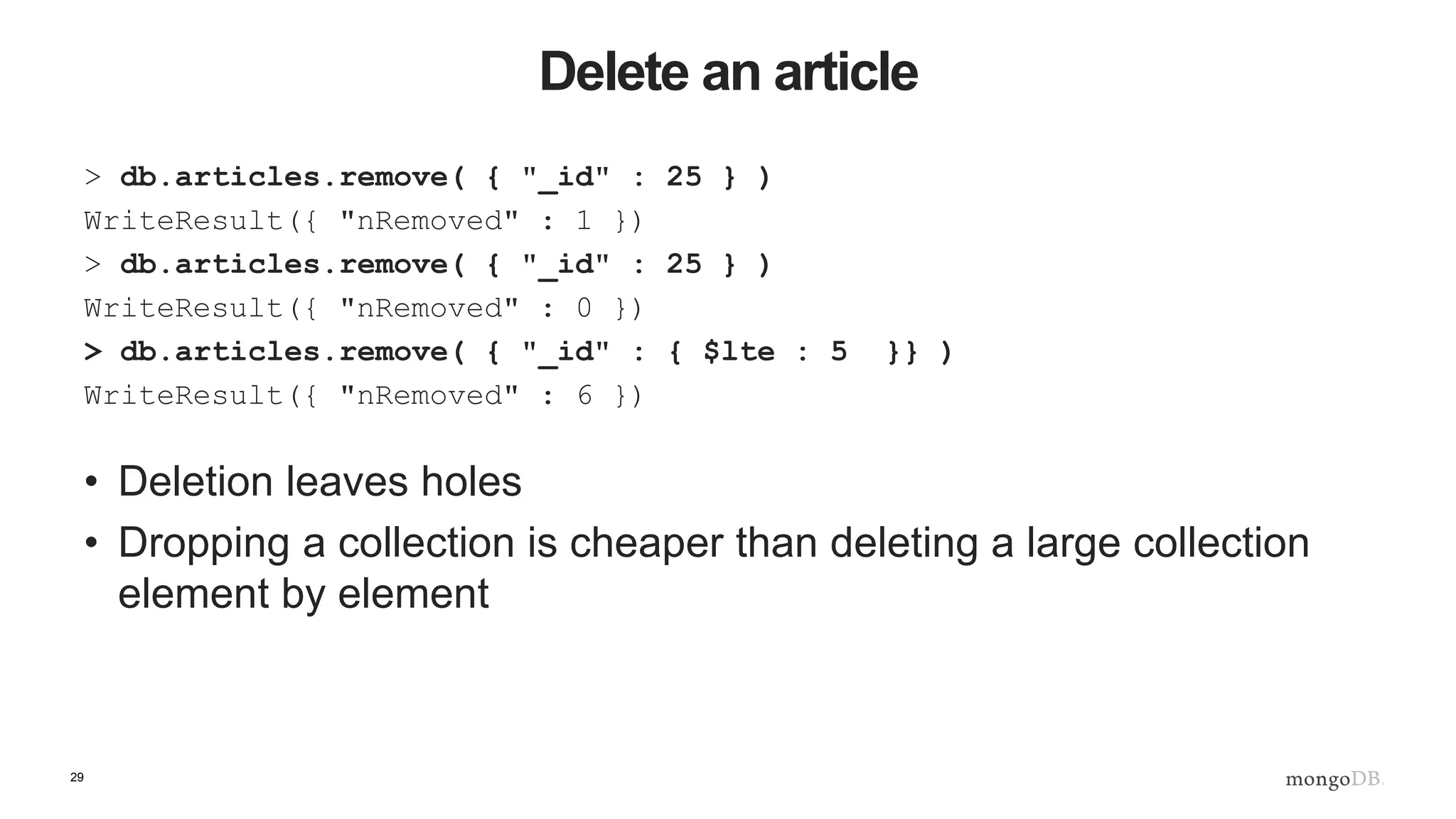
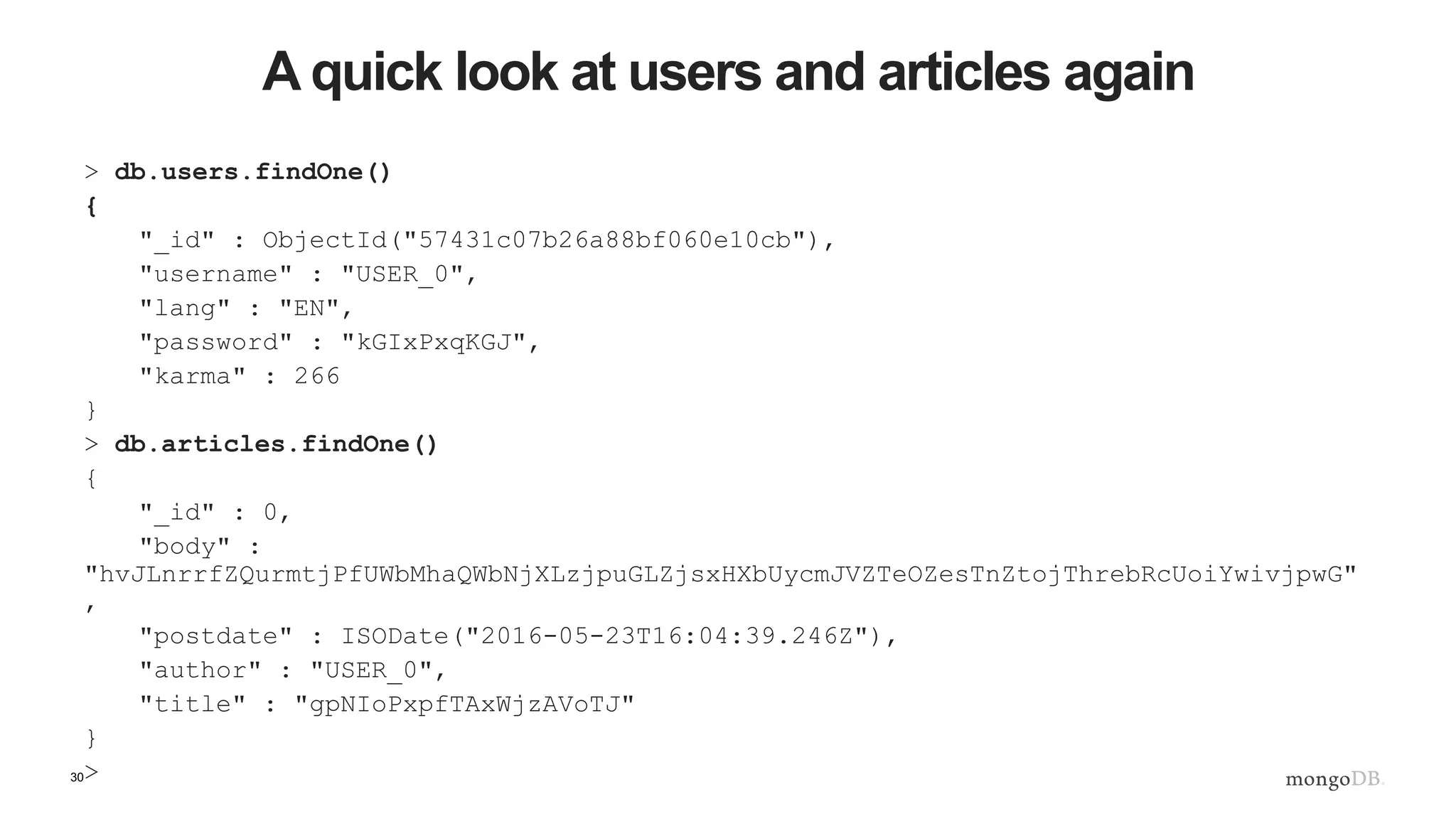

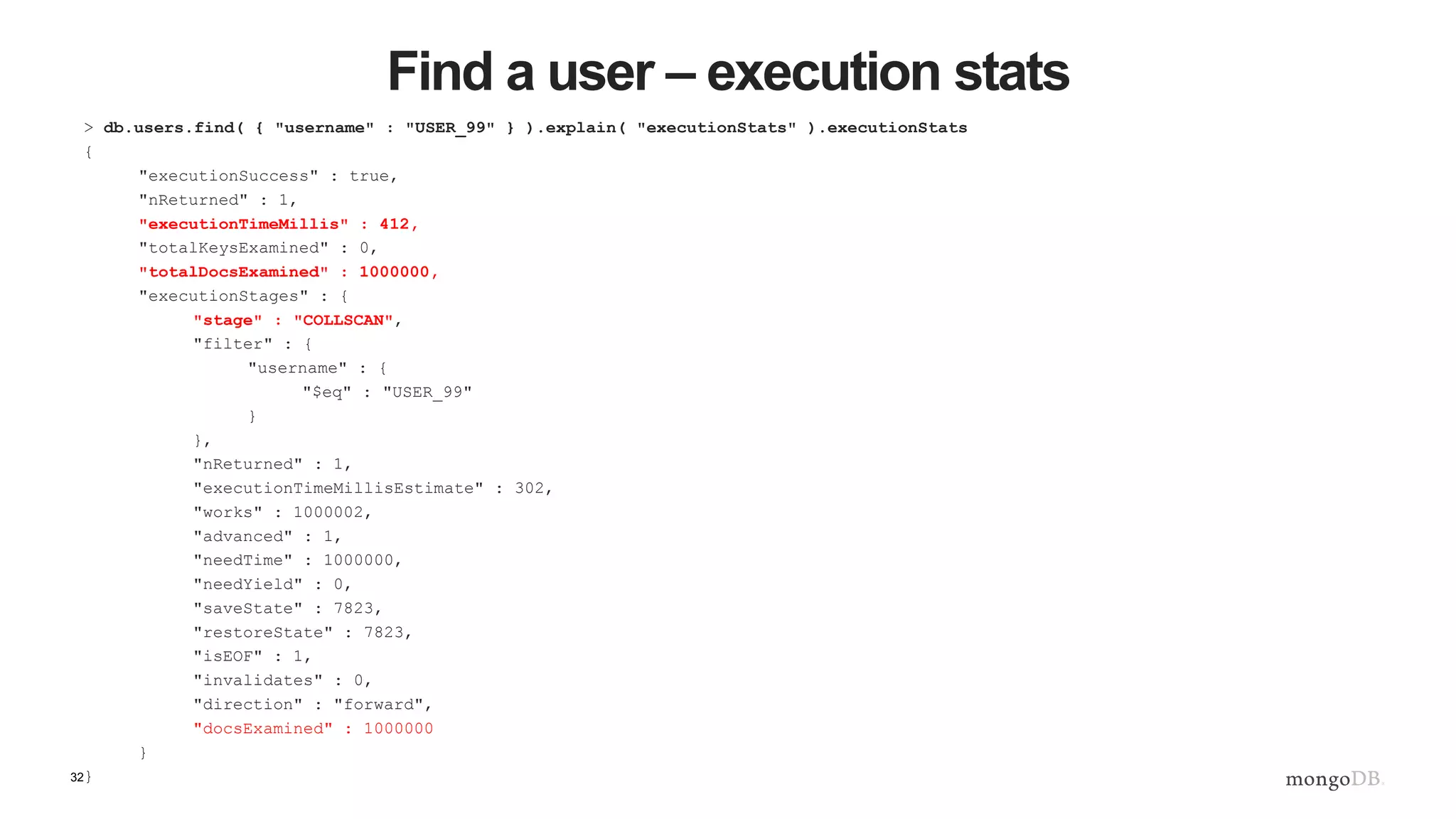
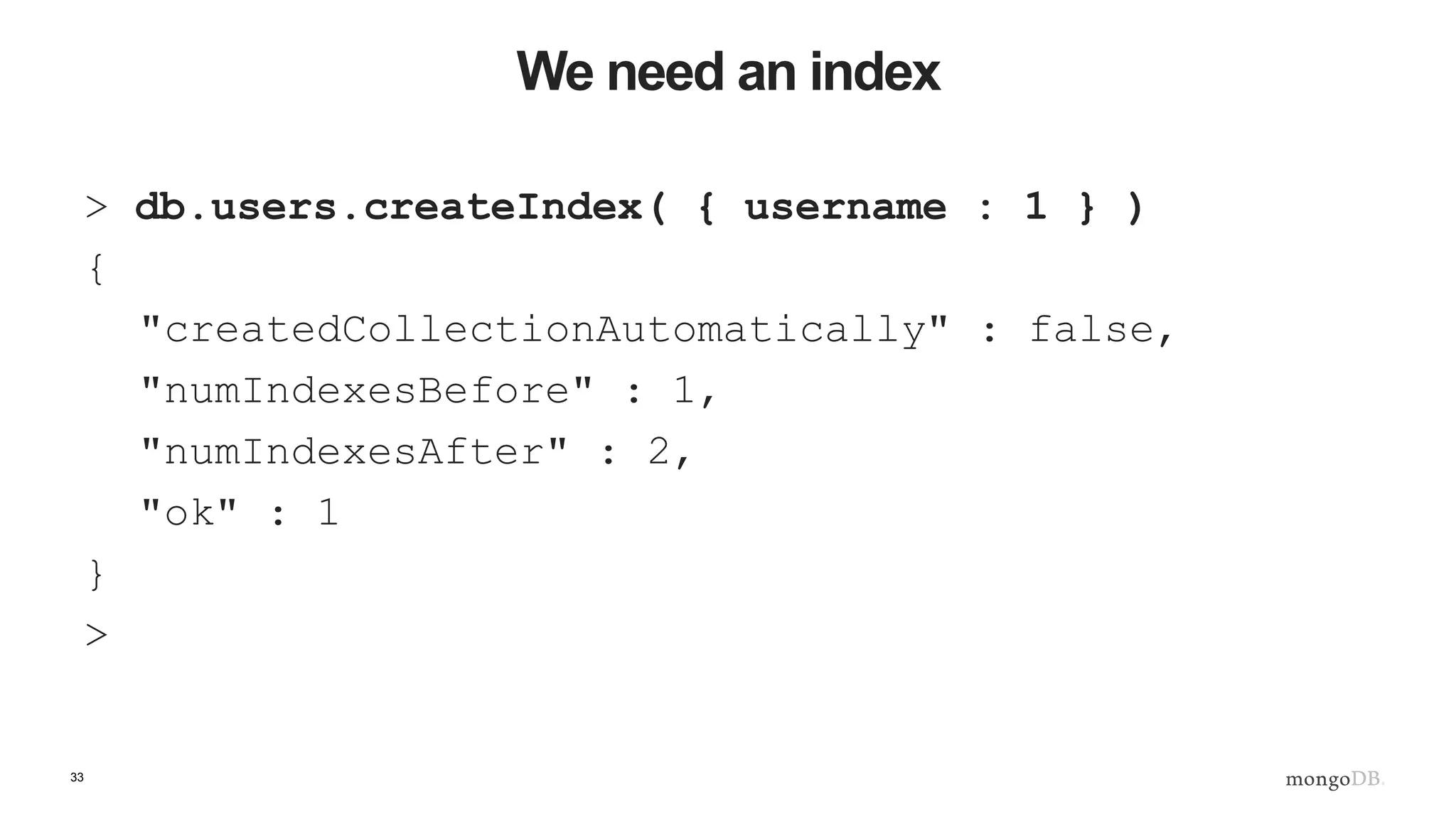
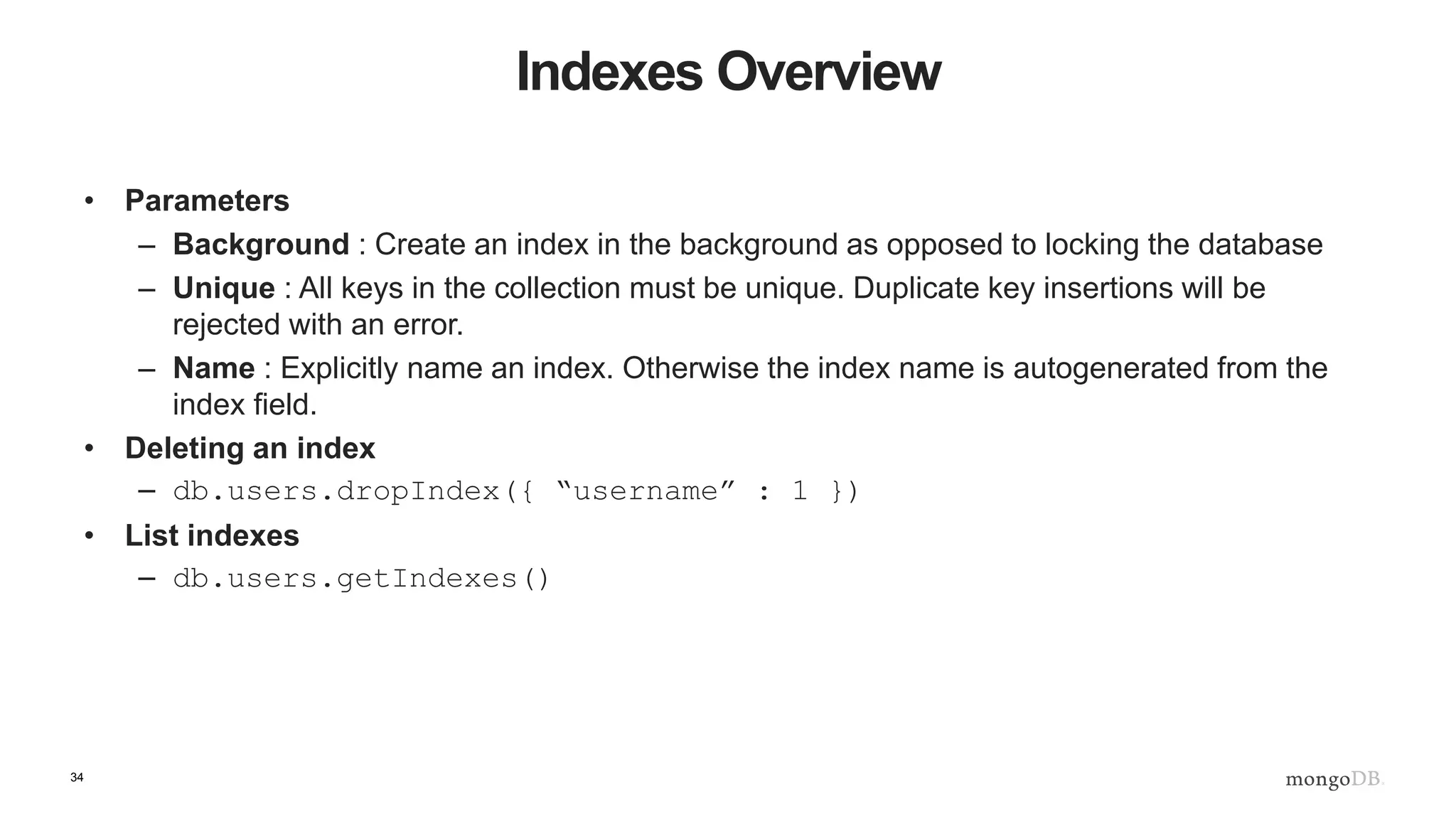
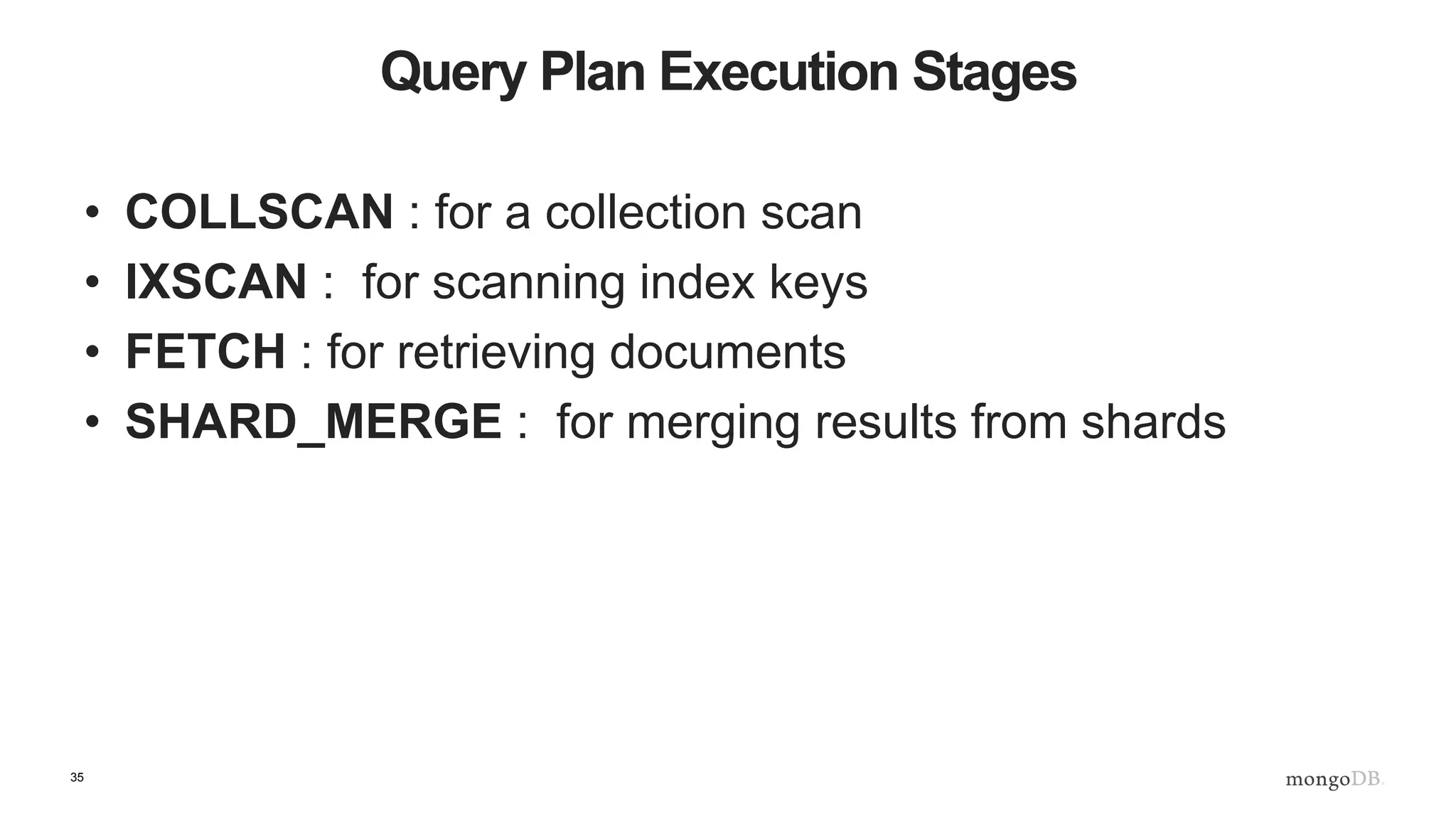
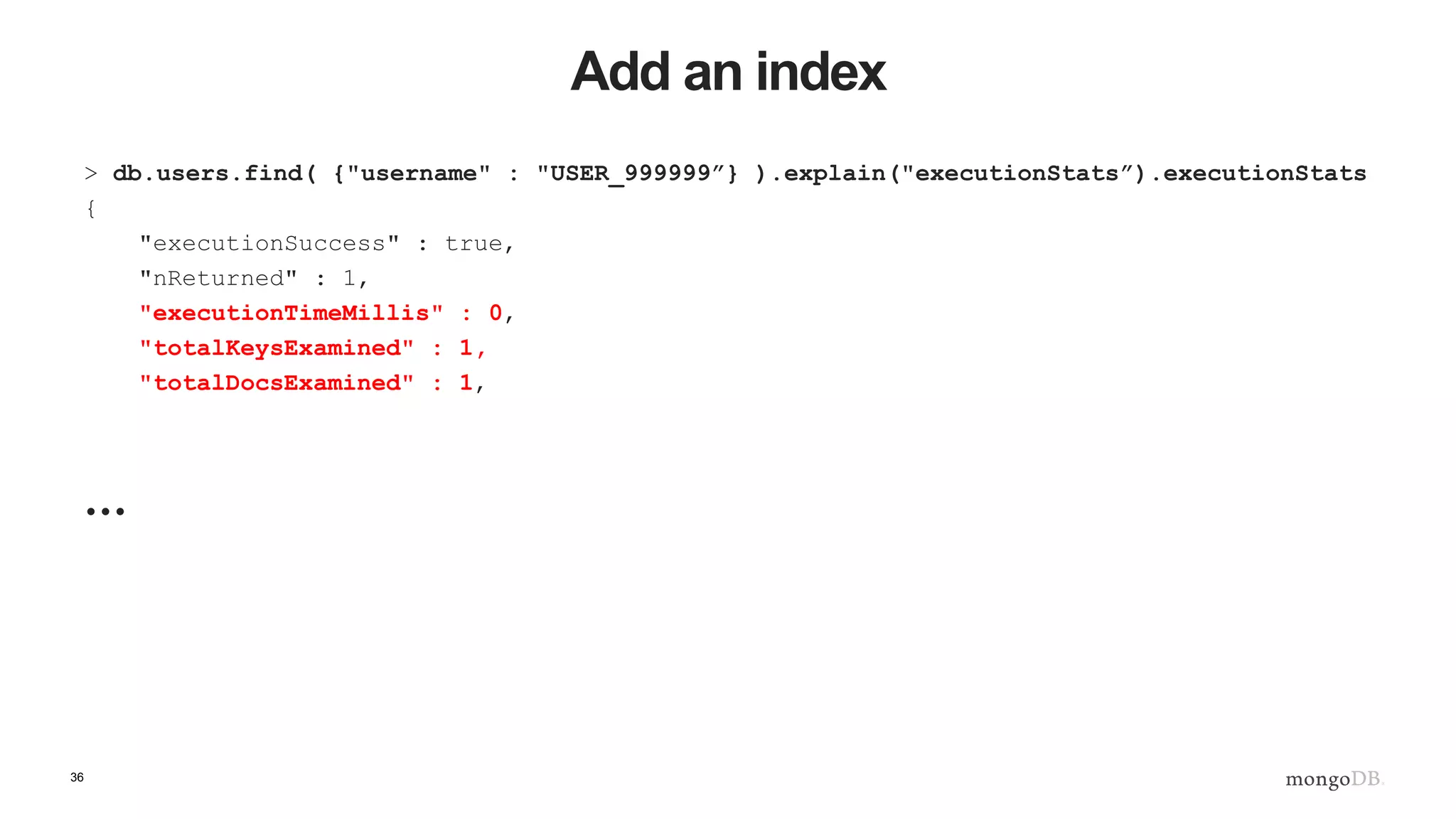
![37 Execution stage "executionStages" : { "stage" : "FETCH", "nReturned" : 1, "executionTimeMillisEstimate" : 0, "docsExamined" : 1,, "inputStage" : { "stage" : "IXSCAN", "nReturned" : 1, "executionTimeMillisEstimate" : 0, "keyPattern" : { "username" : 1 }, "indexName" : "username_1", "isMultiKey" : false, "isUnique" : false, "isSparse" : false, "isPartial" : false, "indexVersion" : 1, "direction" : "forward", "indexBounds" : { "username" : [ "["USER_999999", "USER_999999"]" ] }, "keysExamined" : 1, "seenInvalidated" : 0 } } }](https://image.slidesharecdn.com/b2b-webinar-2-yourfirstmongodbapplication-1-170126162857/75/Back-to-Basics-My-First-MongoDB-Application-37-2048.jpg)
